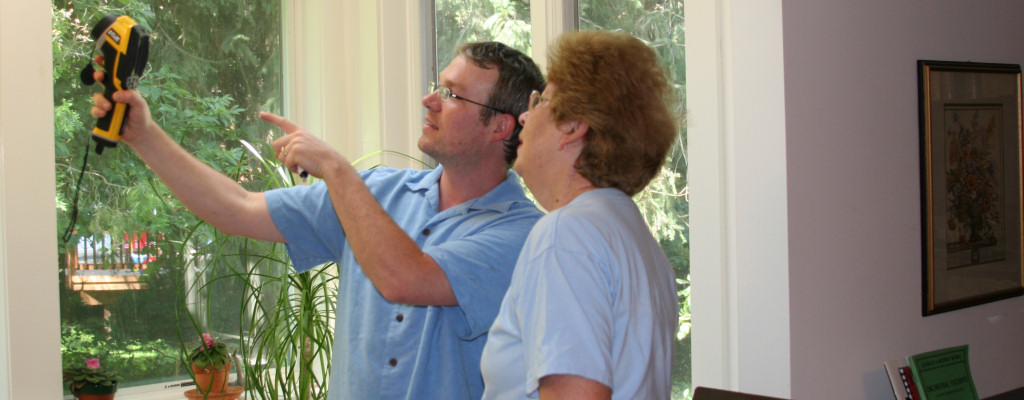With temperatures continuing to rise this summer, your air conditioning system is probably running non-stop. While this might keep you cool, it’s also ramping up your energy bill. To make sure your AC is running as efficiently as possible, it’s always a good idea to conduct an annual home energy audit.
During an audit, all aspects of your home will be reviewed, well beyond your HVAC system itself. A home energy audit includes various tests that are focused on identifying air leaks, issues with insulation, and other ways that unwanted heat can enter your home. These tests are typically done during the winter to locate cold air that is entering your home, but in the summer you can also see where cold air is escaping.
You can conduct a home energy audit by yourself, or you can enlist the help of air conditioning pros – like us! We have many years of auditing experience, and we can quickly identify any trouble spots in your home.
If you’d like to get started now and take a look yourself, below are some ways you can do your own DIY home energy audit. When you’re done, there’s a chance you’ll see upwards of a 30% savings on your energy bill.
Locate air leaks
Your air conditioning might be running well, but if that cold air doesn’t stay in your home, it won’t do you any good. To begin your home energy audit, you’ll want to locate and seal any air leaks to stop that cool air from escaping.
Looking for leaks is as simple as methodically going to each door, window, and even around your flooring and using a smoke pencil to detect air movement. These pencils are available at all major home improvement stores and will emit a non-toxic mix of water vapor and glycerin that shows air movement in the area you spray it. If you see air flowing in a way that it shouldn’t, use caulking or weather stripping to reseal those areas.
Investigate your home’s insulation
While your home almost certainly has insulation already, it’s always important to check how much and what type of insulation you have. Certain types perform better, and materials have gotten more advanced over the years. If your home is older, it’s probably time to add or replace insulation.
To begin checking your insulation, you’ll want to head up into the attic. This is the easiest place to see how much your home has and if it’s still in good condition. While you’re up there, check for any air leaks as well – but be careful not to linger up there – attic temperatures can exceed 120° during the summer months!
Checking the insulation inside your walls is a little more difficult. First, locate an electrical outlet in the wall. Be sure to turn off the power to this area for the next step – you’ll be removing the cover plate on the outlet and probing into the wall with a long stick. If you feel resistance as you move it around, you have insulation in your walls. If it goes straight in with no effort at all, you likely have little to no insulation.
Review your lighting
The final part of your DIY home energy audit is one you can do quickly – reviewing your home’s lighting. Traditional incandescent bulbs are inefficient and emit a lot of heat. They’ll cause your energy bill to increase, and the added heat they give off means your AC has to work even harder to cool your home.
Replace every traditional bulb with LED or fluorescent lights. LED bulbs are exceptionally energy efficient and have a long lifespan, so you won’t have to replace them as often.
Benefits of a professional energy audit
Besides saving you money by identifying inefficient areas in your home, a home energy audit by one of our experts can also help your central air conditioning system last longer. Instead of running your AC at all times to keep your home cool, you can instead use it only when you need it, knowing you can rely on it to properly cool your home.
Additionally, an energy audit can help identify problem areas that might be lowering the air quality in your home. While inspecting your air conditioning unit, we might find that its filter needs to be replaced or there may be blockages elsewhere. Clearing up these issues will let air flow through your home more efficiently and will help to remove more contaminants from the air.
Getting a home energy audit
If you’ve completed the steps above but still want to make sure your AC is working as well as it should, give us a call! We have decades of expertise in evaluating home air conditioning systems, and while we’re conducting your home energy audit, we can also tune up your system, further improving its ability to cool your home as effectively and efficiently as possible.


Comments are closed